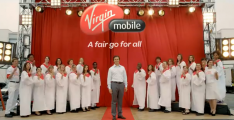Does the rise of collaboration mean the end of the ECD?
 The old school executive creative director’s days are at an end, argues Euro RSCG Sydney’s ECD Steve Coll
The old school executive creative director’s days are at an end, argues Euro RSCG Sydney’s ECD Steve Coll
I started my career in advertising in Belfast in the mid 1990s, in the capacity of junior copywriter/ glorified tea-maker. It was a far cry from Madison Avenue. But our ECD was firmly in the Don Draper mould. His every utterance was to be treasured like the very tears of the saints from heaven above. And, in fairness to him, it was the same in every other decent agency. It was a model for a time when agencies produced Print, TV and Radio. And a Creative Director, like the legendary Dave Trott, could point to proven excellence in all.
But, as the sixth season of Mad Men goes into production, its fair to say the role immortalized by Jon Hamm’s character is under threat.
Last year, when Fallon announced the appointment of their new ECD, Santiago Lucero, they made a very revealing statement, saying Santiago’s role would ‘differ from the traditional remit of an executive creative director in that the agency is not creating a single point of approval and control for agency output’.
That’s a massive shift. But Fallon’s decision is reactive, not proactive.
The truth is the traditional role of the ECD as ‘last line of defense’ for an agency’s creative product is no longer viable. The reason is simple. An agency’s creative product is no longer solely in the hands of the agency. Today’s creative solutions are nowhere near as linear, and many more parties are involved in creating them. In our current creative landscape, we must consider everything from PR to social media to branded content in an effort to solve our clients’ business problems. So we engage other agencies, or the consumer, to deliver the answer. Inevitably, it means an ECD can no longer claim expertise in every discipline of the campaign. Which in turn means an ECD must abdicate total control.
For anyone still clinging to the notion of the old-school ECD, this multi-disciplined collaboration is an un-nerving proposition. But, rather than look at this as a threat, I believe it should be embraced.
In my experience, good collaboration will outshine anything you could have done on your own. I’ll use two campaigns I’ve been personally involved with to illustrate the point.
Firstly, the Walker’s ‘Sandwich’ campaign, which sold over 25 million packets of Walkers crisps and won the Grand Prix for Creative Effectiveness at Cannes. Although we created the campaign at AMV, a huge amount of the eventual success was due to our partners. Freud communication delivered an extremely successful PR campaign.
And our Walkers client also deserves huge credit for their pro-active engagement of the major British supermarket brands. Without these, there’s no doubt it would have been a lesser result.
 Secondly, there’s the Virgin Mobile ‘Doug Pitt’ campaign. This is the truest collaboration I’ve been involved in, with Euro and One Green Bean holding joint creative sessions to arrive at the idea of giving Doug Pitt a fair go. Again, the success of the campaign is a sum of each agency’s efforts, from globally shared content and advertising to a sensational PR and social media campaign that returned seven to one on investment. Not to forget some canny media-buying from Starcom.
Secondly, there’s the Virgin Mobile ‘Doug Pitt’ campaign. This is the truest collaboration I’ve been involved in, with Euro and One Green Bean holding joint creative sessions to arrive at the idea of giving Doug Pitt a fair go. Again, the success of the campaign is a sum of each agency’s efforts, from globally shared content and advertising to a sensational PR and social media campaign that returned seven to one on investment. Not to forget some canny media-buying from Starcom.
These experiences have helped define my take on the role of an ECD.
I still believe agencies, and indeed, clients, need a Creative Director.
But I think today’s challenges demand a more subtle way of directing creative.
Perhaps the most important role the ECD has in any agency is to establish a creative environment, particularly one that promotes collaboration. It should be an environment that encourages active debate, allows diverse ideas to thrive, and gives more people the power to choose the best direction to pursue. And where the Creative Director doesn’t have a monopoly on what’s right.
Yes, someone has to make a final decision about what route to pursue. But the process is much, much more consultative.



 Linkedin
Linkedin
Your ‘Perhaps…’ paragraph is actually the way most decent agencies operate now.
There’s no perhaps about it.
User ID not verified.
I think Steve has highlighted something that has been in play for a few years now. Just look at most thriving agencies around the world and you’ll see the ECD is supported by a diverse team of creative directors and other specialised skills. It’s smart and it’s the only way agencies will survive in the future.
A few years ago everyone focused on old skill V’s new skill, the traditional CD V’s the digital CD. The debate was around who would survive. Today, the diverse skills cannot live without each other and this will continue into the future. Any agency that tries to resist this structure will lose out. Clients will bypass them and they will eventually go out of business.
Steve is an ECD, so it shows guts to say this out loud. I’d say he’s probably taking his agency in the right direction.
User ID not verified.
The ‘Perhaps’ sentence is one of the most concise piece of elephant-room-clearing copy I’ve ever read.
I tip my hat to you sir.
What you describe is a major problem in creative agencies that are attempting to become more digital – reintegrating the ‘creative gods’ back with the mortals and allowing them to achieve outcomes as a team.
User ID not verified.
Nice article Steve.
As a suit i personally will mourn the passing of the ECD, simply because i’ll miss the theatrical and psychological tactics of ECDs in those make-or-break stand off meetings with clients about which edit to go with – the one with the massive packshot and neon branding or the one featuring the dwarf in the futurist gimp mask.
Tactics i’ve witnessed:
Uncontrollable sweats
Studied ambivalence
Psychotic, nervous laughter
Complete silence
Slow rhythmic rocking, building to uncontrollable Romanian orphan like rocking.
Good times.
User ID not verified.
Ah, finally the demise of the ECD without talent or portfolio who always gets his name on the credits anyway.
User ID not verified.
@David,
Very funny. Some others I’ve seen over the years:
Shakespearean snide remarks to promote a general feeling of inadequacy
Ostracising members of different departments, aka ‘the silent treatment’
Micro management combined with indecisiveness to keep everyone guessing
Asking whose idea it was or crediting individuals and not the team
And my favourite: pissing in their own pocket while thanking everyone for all the hard work they’d never have done if his royal highness ECD wasn’t there.
User ID not verified.